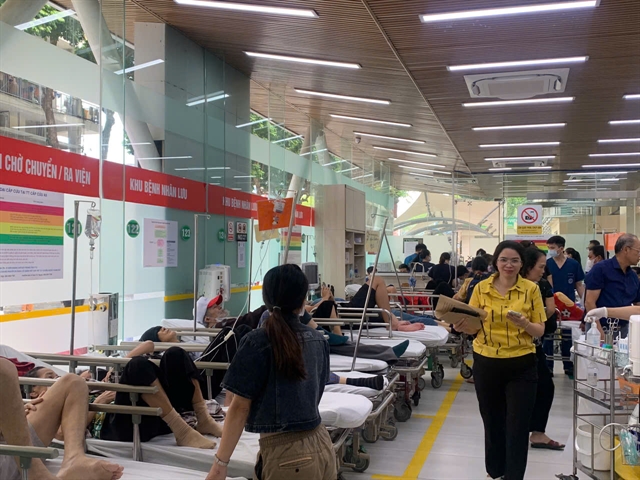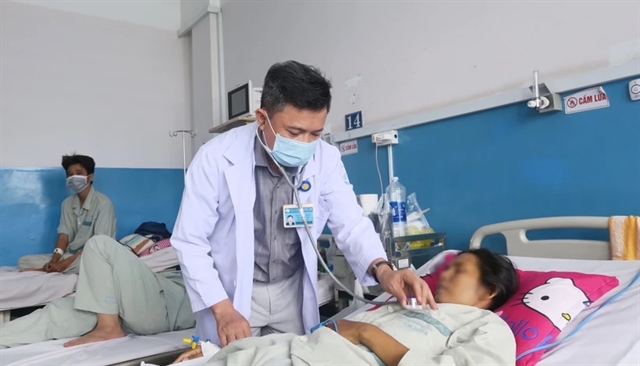 Society
Society

 |
| A measles patients at HCM City's Tropical Disease Hospital. VNA/VNS Photo |
HÀ NỘI – Complex and increasing in frequency in specific areas - the forecast for infectious diseases in 2025 is a growing concern.
Dengue fever remains a global public health challenge, and there is still no specific treatment for hand, foot, and mouth disease, according to the Department of Preventive Medicine.
Although infectious diseases nationwide were largely under control in 2024, some diseases, such as measles, pertussis, rabies, dengue fever, and diphtheria, saw spikes in certain localities.
Deputy director of the Department of Preventive Medicine, Nguyễn Lương Tâm, said that there were 141,000 recorded cases of dengue fever nationwide in 2024, although this was a 16.7 per cent decrease compared to 2023. There were 28 deaths, a reduction of 17 fatalities from 2023.
Hải Phòng recorded the highest number of cases, exceeding 23,000, followed by HCM with over 14,000 cases.
Cases of hand, foot, and mouth disease numbered over 76,000, also a fall, a 55 per cent decrease from 2023, with no fatalities reported.
However there were a high number of cases recorded in areas such as HCM City with 17,882, Tiền Giang Province - 5,467, Đồng Nai Province - 4,968, An Giang Province - 4,187, and Đồng Tháp Province - 3,717.
For seasonal influenza, 287,548 cases were reported nationwide in 2024, with eight fatalities. Compared to 2023, the number of cases decreased by 18 per cent, but the number of deaths increased by five.
Provinces with high case numbers included Thanh Hóa with 46,600, Thái Bình - 26,345, Nghệ An - 17,949, Hà Tĩnh - 12,807, and Sơn La - 10,162.
Measles presented particularly complex developments in 2024, with high case numbers in provinces such as Đồng Nai (6,360), HCM City (4,758), Bình Dương (4,745), and Cà Mau (2,405). Thirteen fatalities due to measles were recorded nationwide.
The Department of Preventive Medicine attributed the rise in infectious diseases to the unpredictable and persistent nature of outbreaks, which carry a risk of escalation.
Additionally, the COVID-19 pandemic disrupted vaccination coverage, and public awareness of disease prevention remains limited.
Many parents have neglected or delayed vaccinations for their children, leading to a resurgence in vaccine-preventable diseases like measles.
Deputy Minister of Health Nguyễn Thị Liên Hương emphasised that COVID-19 served as a wake-up call for the world.
The healthcare system was pushed to its limits, economies suffered, social security was undermined and people's lives were disrupted while the immediate crisis has passed, the lessons remain.
Dengue fever is a persistent challenge
Addressing challenges in disease prevention, Tâm highlighted that periodic shortages of medications, equipment and medical supplies have significantly hindered epidemic control efforts.
“Looking ahead to 2025, infectious diseases are expected to remain complex. Dengue fever, in particular, remains a global public health challenge exacerbated by factors such as climate change, increased trade and travel, urbanisation, migration and difficulties in vector control,” Tâm said.
“Moreover, hand, foot, and mouth disease still lacks a specific treatment. Widespread complacency in adopting personal preventive measures is prevalent, especially among children in educational settings such as preschools and kindergartens, increasing infection risks,” he added.
Measles and other vaccine-preventable diseases continue to pose risks as vaccination rates fail to meet necessary coverage levels, and vaccination management remains inadequate, potentially leading to more hospitalisations.
Rabies has continues to have a high mortality rate due to limited control of dog and cat populations, low vaccination rates among these animals, and the public not seeking timely vaccinations and treatment following bites.
Emerging infectious diseases that transmit from animals to humans, such as Mpox, remain a concern due to the potential for new variants.
Highly pathogenic avian influenza also poses a threat as the virus continues to be detected in poultry in various regions.
Strengthening preparedness for 2025
To ensure effective and sustainable infectious disease control, the Ministry of Health will collaborate closely with relevant agencies to implement the 2025 infectious disease prevention plan.
Efforts will focus on improving capacities for early detection, forecasting, and containment of outbreaks, ensuring adequate resources and funding and mobilising participation from local governments, political organisations and the public.
On what is International Day of Epidemic Preparedness, (December 27) the Ministry of Health called on citizens to enhance personal preventive practices, protect their health and that of their families and communities, and support public health initiatives.
It also urged continued collaboration between sectors, organisations, and international partners in infectious disease prevention.
Businesses have also played a pivotal role in strengthening disease prevention efforts. A standout example is the “For a Healthy and Sustainable Vietnam” programme, a partnership between the Ministry of Health and Unilever Vietnam for the 2023-2028 period, which focuses on improving public health and raising sanitation awareness.
Last year, the "Clean Bus Ride" campaign, led by Lifebuoy in collaboration with the Vietnam Young Doctors' Association, reached thousands of people across 30 provinces. The initiative offered medical consultations, free health check-ups, and hygiene education, making a significant impact on community health.
Lê Thị Hồng Nhi, Vice President of Communications, Corporate Affairs and Sustainability at Unilever Vietnam, said: “Beyond providing products, we aim to enhance community awareness on disease prevention. We aspire to continue supporting government agencies with advanced technologies like AI and forecasting tools to disseminate prevention messages more effectively.” VNS




